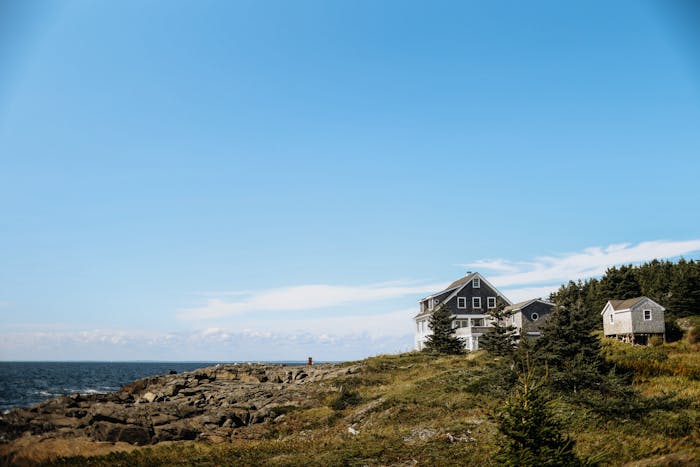Squatters rights present a nightmare scenario for property owners. They enable an unauthorized person to claim ownership of an abandoned, vacant, or foreclosed property simply because they have lived there for a certain period.
Many states around the country have implemented squatters rights and adverse possession laws to promote active land use so properties don’t fall into disrepair. These laws encourage landlords to check on their properties from time to time, lest a squatter take up residence.
Maine does have laws surrounding squatters’ rights and adverse possession, and Maine landlords must know these laws to protect their properties. TurboTenant has created a guide to adverse possession and squatters rights in Maine, with information for both landlords and tenants.
Key Takeaways
- Squatters rights in Maine do exist, enabling residents to make a claim of adverse possession after a period of residence.
- That period of residence must be proven to be actual, open and notorious, hostile, exclusive, and continuous for a period of at least 20 years.
- Landlords should frequently check on their properties to discourage squatting and take swift legal action if a squatter is discovered.
- TurboTenant’s property management software can help landlords manage their properties more efficiently and prevent squatter situations.
Squatter Rights vs. Adverse Possession in Maine
The terms squatters rights and adverse possession are often used interchangeably to refer to the same law. More specifically, though, squatters rights refer to the rights of a person who has taken up unauthorized residence on a property, while adverse possession describes the legal process that enables squatters to take possession of a property.
Squatters must fulfill certain parameters to claim adverse possession in Maine. However, it is a relatively complex and lengthy process for a squatter to take adverse possession of a property in Maine compared to other states.
Squatter vs. Trespasser
To take adverse possession of a property, a squatter must qualify as such rather than as a trespasser. This is very important when the adverse possession claim inevitably reaches court. Trespassing is viewed as a criminal act and can be prosecuted while squatting is considered a matter for civil courts.
However, squatters can be charged with trespassing in some instances. The situation will likely be considered trespassing if the property was occupied when the squatter moved in or if the squatter did not take steps to improve the property.
The amount of time spent on the property also factors in — trespassers may move on and off of a property for long periods of time, while squatters must use a property as their primary residence, with no long absences.
Maine Laws on Squatters
Maine squatters rights differ only slightly from those across the rest of the country. At their most basic, they allow squatters to claim adverse possession of a property if specific legal requirements are achieved (we’ll get to those shortly). The laws differ somewhat for uncultivated property, such as woodlands or swamps.
Additional rules may apply in different municipalities, such as Portland, where squatters may be removed from public areas if they constitute a public safety risk or a barrier to public spaces.
Overall, squatting is considered an illegal activity, and it can carry penalties for trespassing, unlawful occupancy, or nuisance, incurring fines of $50 to $500, depending on the location. Squatting could also lead to potential jail time for those who have been previously removed from a property.
How Squatters Can Legally Claim Property in Maine
As mentioned, squatters must fulfill a set of legal conditions before they can make a claim for adverse possession. Most importantly, Maine squatters rights require that a squatter reside continuously on a property for 20 years before a claim of adverse possession can be made.
Understandably, it can be difficult to fulfill that condition alone. The other requirements of squatters rights in Maine stipulate that the squatter’s possession of the property must be:
- Actual: The squatter must be using the property as their primary place of residence — not as a storage space or a part-time residence. They must physically reside on the property and/or use the entire property.
- Open and Notorious: The squatter must not attempt to conceal their residence on the property. Instead, the squatter must make it obvious that they reside on the property through property improvements, posted signs, or notifying neighbors.
- Exclusive: The squatter must be the sole person occupying the property for the required 20-year period, at the exclusion of the property owner. The property owner must not use or occupy the property during this period.
- Hostile: The squatter must prove that their residence on the property is unauthorized and, furthermore, goes against the property owner’s rights. The property owner cannot have given permission for the squatter to reside on their property.
Any adverse possession claim not meeting the above requirements will most likely be denied in court. Unlike other states, adverse possession in Maine does not require the payment of property taxes or color of title (a document that appears to be a valid title but actually is not).
The notable exception to this is in regards to uncultivated property, in which case, both color of title and payment of property taxes for at least 20 years are required for adverse possession.
Adverse Possession Steps
If the adverse possession claim does meet the above requirements, squatters rights in Maine state that the squatter can acquire property rights via the following steps:
- File a lawsuit for adverse possession with Maine’s courts.
- Provide documentation of a continuous, 20-year residence upon the property.
- Provide documentation that the continuous, 20-year residence upon the property was actual, open and notorious, exclusive, and hostile.
- Undergo a civil trial or hearing in which evidence is presented on both sides, and the court makes a ruling accordingly.
- File for a new deed to the property if the squatter’s rights are recognized and upheld by the court.
Landlord Rights and Responsibilities
Although squatters rights in Maine can seem daunting, landlords have certain rights that grant protection from adverse possession claims. Those rights include the following:
- The right to initiate eviction proceedings against squatters
- The right to evict and criminally prosecute trespassers
- The right to contest adverse possession claims in civil court
However, landlords must uphold specific standards to retain ownership of their properties and prevent adverse possession in Maine. Those responsibilities include the following:
- Must frequently check on and, ideally, maintain the property
- Must quickly take legal action to remove squatters and/or trespassers from property
- Must thoroughly document any factor that could disrupt a squatter’s adverse possession claim
Tenant Rights and Responsibilities
Though no rental agreement exists between the landlord and the squatter, squatters do classify as tenants under Maine squatters rights laws. However, squatters do not possess the same rights as typical tenants, such as the right to anti-eviction protections.
That said, squatters do possess the following rights:
- The right to make improvements to an abandoned, foreclosed, or vacant property upon which they are residing
- The right to claim adverse possession of a property following a 20-year period of continuous, actual, open and notorious, exclusive, and hostile residence upon said property
Despite these privileges, squatters rights in Maine state that squatters also have several responsibilities required of them in any adverse possession case:
- Must thoroughly document their 20-year period of continuous, actual, open and notorious, exclusive, and hostile residence on a property
- Must file a claim for adverse possession and provide proof that supports that claim
- Must file for a new deed of ownership, should the court rule in their favor
How to Evict Squatters in Maine
If a landlord becomes aware of a squatting or trespassing situation on their property, they should immediately learn how to evict a squatter in Maine before the matter can progress into an adverse possession case. Under adverse possession in Maine, the eviction process for squatters is the same as the eviction process for a typical tenant.
To initiate eviction proceedings against squatters, landlords must follow these steps:
- Provide a seven-day Notice to Quit for non-payment of rent or illegal activity or a 30-day Notice to Quit for any other violations
- File an eviction suit in court
- Obtain a writ of possession, which enables a sheriff (not the police) to remove the squatter from the property forcibly
Landlords cannot physically remove squatters, which could lead to criminal or civil charges.
Legal Help for Landlords in Maine
Landlords who wish to prevent squatting or who need assistance in disputing an adverse possession claim have a significant number of legal resources at their disposal. To start, property owners facing adverse possession in Maine should find a real estate attorney versed in the state’s laws governing squatters rights.
Maine landlords should pick legal advisors with expertise in Maine squatters rights, ideally an attorney who has already won a case in favor of the landlord. Low-income property owners can utilize online databases, such as Pine Tree Legal Assistance and LSC Legal Aid Finder, to find further civil assistance.
Other resources include the Maine.gov online portal, where one can access previous statements and other information pertaining to squatters rights in Maine.
Preventing Squatter Situations
Obviously, no landlord wants to hear that an unauthorized “tenant,” who has not paid rent and is living on a property against their wishes, is capable of filing an adverse possession claim and taking ownership of their property. Luckily, there are many different ways to prevent this from happening.
The best way to prevent squatter situations is to regularly visit the property and ensure nobody lives there without authorization. Post “No Trespassing” signs to make it clear that trespassers will be prosecuted, and consider installing security cameras and lighting to discourage potential intruders. Additionally, ask for reports from neighbors or have a friend stop by occasionally to ensure everything is above board.
Landlords can also use property management software, such as that offered by TurboTenant, to better manage their properties and avoid squatting situations.
How TurboTenant Can Help
TurboTenant offers free property management software that enables landlords to manage their properties from near or far efficiently. Part of the platform is thorough screenings for potential tenants so property owners can quickly fill their units with qualified tenants.
TurboTenant also provides a sample lease agreement specific to the state of Maine. Landlords can easily make adjustments to include provisions against holdover tenants and unauthorized residents.
Sign up for a free account today and see how TurboTenant can help you keep your property occupied and avoid squatting situations in the first place.
Disclaimer: TurboTenant does not provide legal advice. This material has been prepared for informational purposes only. All users are advised to check all applicable local, state, and federal laws and consult legal counsel should questions arise.
Are there squatter rights in Maine?
Yes, Maine does recognize squatter rights to adverse possession of property in Maine.
Can you move into an abandoned house in Maine?
Yes and no. Squatters can move into an abandoned house in Maine; however, they have no legal right to do so and may be prosecuted on trespassing, burglary, or nuisance charges. If squatters are able to fulfill a set of legal conditions and remain in continuous residence on the property for 20 years or more, then they may file a claim for adverse possession and take ownership of the property.
How long is adverse possession in Maine?
Adverse possession in Maine requires a squatter to reside upon a property as their primary place of residence for at least 20 years.
Can police remove squatters in Maine?
Police cannot remove squatters in Maine, but a sheriff can. However, this can only be done after a landlord has initiated and successfully completed eviction proceedings and obtained a writ of possession from the courts.


